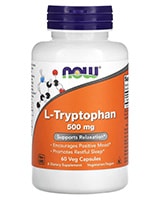

Tryptophan, an essential amino acid, plays a crucial role in the body’s production of serotonin and melatonin, two key chemicals involved in regulating mood, sleep, and various other physiological functions. This article explores seven key benefits of tryptophan for both mental and physical health, supported by scientific research, and highlights natural sources of this important nutrient.
Elevates Mood and Combats Depression
Tryptophan’s conversion into serotonin, often referred to as the “happiness hormone,” is vital for mood regulation. Serotonin deficiencies have been linked to depression and anxiety. Studies suggest that increasing tryptophan intake can alleviate symptoms of depression[1]Correia, A. S., & Vale, N. (2022). Tryptophan Metabolism in Depression: A Narrative Review with a Focus on Serotonin and Kynurenine Pathways. International Journal of Molecular Sciences, 23(15). https://doi.org/10.3390/ijms23158493 by boosting serotonin levels. This provides a natural and effective way to enhance mood and combat depressive states.
Enhances Sleep Quality
The body converts tryptophan into melatonin, a hormone critical for regulating the sleep-wake cycle. By increasing tryptophan levels through diet or supplements, individuals can improve their sleep quality[2]Sutanto, C. N., Loh, W. W., & Kim, J. E. (2022). The impact of tryptophan supplementation on sleep quality: a systematic review, meta-analysis, and meta-regression. Nutrition Reviews, 108(2), 306-316. https://doi.org/10.1093/nutrit/nuab027. This is especially beneficial for those struggling with sleep disorders, as tryptophan aids in normalizing sleep patterns and reducing the time it takes to fall asleep.
Supports Cognitive Function and Memory
Serotonin produced from tryptophan not only affects mood but also plays a significant role in cognitive function and memory. Research indicates that adequate tryptophan levels can enhance cognitive abilities[3]Jenkins, T. A., Nguyen, J. C. D., Polglaze, K. E., & Bertrand, P. P. (2016). Influence of Tryptophan and Serotonin on Mood and Cognition with a Possible Role of the Gut-Brain Axis. Nutrients, 8(1), 56. https://doi.org/10.3390/nu8010056, including improved memory and executive function. This suggests that tryptophan could be a key nutrient in maintaining and boosting brain health.
Promotes Gut Health
Beyond its impact on the brain, serotonin also influences gut health. It aids in controlling bowel movements and overall digestive function[4]Yusufu, I., Ding, K., Smith, K., Wankhade, U. D., Sahay, B., Patterson, G. T., Pacholczyk, R., Adusumilli, S., Hamrick, M. W., Hill, W. D., Isales, C. M., & Fulzele, S. (2021). A Tryptophan-Deficient Diet Induces Gut Microbiota Dysbiosis and Increases Systemic Inflammation in Aged Mice. International Journal of Molecular Sciences, 22(9), 5005. https://doi.org/10.3390/ijms22095005. Since a large portion of serotonin is produced in the gut, tryptophan intake is essential for maintaining a healthy digestive system. This highlights the interconnectedness of mental and physical health, with tryptophan acting as a vital link.
Aids in Pain Management and Recovery
Tryptophan’s role in increasing serotonin levels contributes to its ability to enhance pain tolerance and facilitate recovery. This amino acid has been found to help manage chronic pain conditions[5]Tanaka, M., Török, N., Tóth, F., Szabó, Á., & Vécsei, L. (2021). Co-Players in Chronic Pain: Neuroinflammation and the Tryptophan-Kynurenine Metabolic Pathway. Biomedicines, 9(8), 897. https://doi.org/10.3390/biomedicines9080897, reducing discomfort and improving quality of life. Furthermore, tryptophan is crucial for protein synthesis, supporting muscle repair and recovery after physical activity. By promoting serotonin production, tryptophan can help mitigate pain and accelerate the healing process, making it a valuable nutrient for those engaged in regular exercise or recovering from injury.
Regulates Appetite and Helps With Weight Management
The serotonin produced from tryptophan also has a significant impact on appetite and eating behaviours. By regulating serotonin levels, tryptophan can help control cravings and reduce overeating[6]Wurtman, R. J., & Wurtman, J. J. (1995). Brain serotonin, carbohydrate-craving, obesity and depression. Obesity Research, 3(Suppl 4), 477S-480S. https://doi.org/10.1002/j.1550-8528.1995.tb00215.x, contributing to healthier weight management strategies. This regulation of appetite underscores the importance of tryptophan in maintaining a balanced diet and supporting weight loss goals.
Contributes to Heart Health
While the direct impact of tryptophan on heart health requires further research, the benefits of improved sleep, mood, and stress levels indirectly contribute to cardiovascular wellness. Serotonin’s role in mood regulation can reduce stress-related factors that are known to affect heart health negatively. Additionally, the potential of tryptophan to aid in weight management and reduce pain can further support cardiovascular health by promoting a more active lifestyle and reducing inflammation.
Sources of Tryptophan
To ensure adequate intake of tryptophan, incorporating a variety of foods rich in this amino acid into your diet is important. Animal products like chicken, eggs, and fish are excellent sources. For those following a plant-based diet, nuts, soy, pumpkin and sesame seeds, and tofu provide good tryptophan levels. It’s also crucial to consume foods rich in iron, vitamin B6, and vitamin B2, as these nutrients are essential for the optimal metabolism of tryptophan.
Incorporating these sources into your diet can help maximize the transformative benefits of tryptophan on your mind and body, supporting overall health and well-being.
Conclusion
Tryptophan’s wide-ranging impact on both the mind and body highlights its importance as an essential amino acid. From elevating mood and enhancing sleep quality to supporting cognitive function, gut health, and pain management, the benefits of tryptophan are profound. Its role in regulating appetite and indirectly contributing to heart health further underscores its value in a balanced diet.
Understanding and leveraging the power of tryptophan can lead to significant improvements in overall well-being. By incorporating a variety of tryptophan-rich foods into your diet and ensuring adequate intake of complementary nutrients, you can tap into the amino acid’s full potential. Whether you’re looking to boost your mood, improve sleep, or support physical recovery, tryptophan offers a natural pathway to achieving these health goals.
Buy Tryptophan Online Review Comparison Table
 L-Tryptophan | iHerb | 60 pills (500mg) | $13.46 |  Worldwide, AU | Visit Website >> |
References
| ↑1 | Correia, A. S., & Vale, N. (2022). Tryptophan Metabolism in Depression: A Narrative Review with a Focus on Serotonin and Kynurenine Pathways. International Journal of Molecular Sciences, 23(15). https://doi.org/10.3390/ijms23158493 |
|---|---|
| ↑2 | Sutanto, C. N., Loh, W. W., & Kim, J. E. (2022). The impact of tryptophan supplementation on sleep quality: a systematic review, meta-analysis, and meta-regression. Nutrition Reviews, 108(2), 306-316. https://doi.org/10.1093/nutrit/nuab027 |
| ↑3 | Jenkins, T. A., Nguyen, J. C. D., Polglaze, K. E., & Bertrand, P. P. (2016). Influence of Tryptophan and Serotonin on Mood and Cognition with a Possible Role of the Gut-Brain Axis. Nutrients, 8(1), 56. https://doi.org/10.3390/nu8010056 |
| ↑4 | Yusufu, I., Ding, K., Smith, K., Wankhade, U. D., Sahay, B., Patterson, G. T., Pacholczyk, R., Adusumilli, S., Hamrick, M. W., Hill, W. D., Isales, C. M., & Fulzele, S. (2021). A Tryptophan-Deficient Diet Induces Gut Microbiota Dysbiosis and Increases Systemic Inflammation in Aged Mice. International Journal of Molecular Sciences, 22(9), 5005. https://doi.org/10.3390/ijms22095005 |
| ↑5 | Tanaka, M., Török, N., Tóth, F., Szabó, Á., & Vécsei, L. (2021). Co-Players in Chronic Pain: Neuroinflammation and the Tryptophan-Kynurenine Metabolic Pathway. Biomedicines, 9(8), 897. https://doi.org/10.3390/biomedicines9080897 |
| ↑6 | Wurtman, R. J., & Wurtman, J. J. (1995). Brain serotonin, carbohydrate-craving, obesity and depression. Obesity Research, 3(Suppl 4), 477S-480S. https://doi.org/10.1002/j.1550-8528.1995.tb00215.x |

Leave a Reply